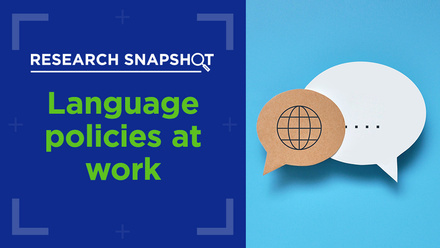Staff exchange programmes and campus internationalisation

Today and tomorrow on the EAIE blog, we are highlighting the winter issue of the EAIE’s member magazine Forum on the theme of Internationalisation at Home. While mobility may still reign as a key aspect of internationalisation, it is by no means the only one. Coined in 1999 within the EAIE, Internationalisation at Home is today more than an alternative to mobility: it is a strategy in its own right. Today’s authors discuss a case study from George Mason University illustrating how well-thought-out staff mobility programmes can internationalise the campus at home.
Many universities devote resources to improving students’ readiness for global careers or facilitating the international research of faculty members. These are not the only campus populations eager to broaden their global skills, however. Professional staff, the lynchpins of campus operations, are often overlooked in strategic plans for internationalisation. Work lives of staff receive proportionately little attention in higher education overall.[i] As international competence is increasingly recognised as a ‘generalised necessity’ rather than an option for elites, and everyone benefits if professional staff are offered opportunities to develop global skill sets.[ii] But where do we begin?
An exciting option
Staff members who work outside of international offices may have few options to gain global experience. Professional staff exchange programs are cost-effective means to promote internationalisation among an underserved population. The experiences of George Mason University, USA and its European partners provide examples. Mason’s strategic plan commits to fostering a global mind-set among students, faculty, and staff. To that end, its Global Strategies Office (GO) created the Global Professional Staff Exchange Program (GPSEP).
Jointly managed with the University Staff Senate and operating in collaboration with European partners, GPSEP gives staff the chance to network and learn among international counterparts during a week of professional development abroad. Foreign staff also comes to Mason for a parallel learning experience. GPSEP enhances global awareness, encourages the development of cross-cultural perspectives, and broadens career skills through direct in-service experiences. In another respect, it exposes local staff to the work ways and mind-sets of international colleagues engaged in reciprocal visits.
A popular programme
GPSEP is open to full-time classified staff employees with little overseas experience. Prospective participants submit essays addressing how GPSEP would assist them in their current position, what they would gain from international professional development more generally, and how the experience can enhance their future service. They agree to provide a report to the Staff Senate, GO and home unit upon their return, meet with European staff who visit Mason in the future, and serve on a future selection committee. A resume and supporting letter from their supervisor are required.
Applications first go to the University Staff Senate, which recommends five finalists. A GO subcommittee makes final selections and manages logistics for local awardees and those from European partner schools. Mason and its partners provide housing and some meals for international visitors, offer them a rich professional development experience, and furnish a schedule to the awardee and partner university in advance. Each institution covers the cost of its respective participant’s travel and incidentals.
GPSEP has proven extremely popular in its first three years. Mason’s first recipient, an assistant director of academic services at the School of Business, noted that her development opportunity at Germany’s Hohenheim University (Stuttgart), gave her “the global experience I regularly encourage my students to seek”. Upon her return, her global competency and enthusiasm for international projects were recognised by her supervisors; her responsibilities were revised to include handling study abroad curriculum decisions and serving as her college’s global liaison. Her final report stated that “taking part in staff exchange gave me a deeper understanding of the global decisions made on a daily basis by higher level administrators. Identifying differences and similarities between Mason and units abroad was essential to my growth”. The employee has subsequently been promoted to a position with broader global responsibilities.
The experiences of a programme coordinator at Mason’s library were similarly successful. That staff member, who had never travelled abroad, was sent to the University of Basel, Switzerland to learn about preservation and digitisation processes as well as university library partnerships with city governments. She has since shared what she learned at an annual all-staff libraries meeting, presenting on how “collaborative efforts between collegiate library systems and surrounding cities promote successful learning experiences”.
International university staff participants derive similar benefits. An awardee from the University of Basel remarked about her Mason visit, “I found the experience most enriching when [US] staff members were working in fields related to my own area. It was surprising but also reassuring to see them deal with some of the same issues that we experience. However, I also got to learn about very specific challenges that confront US universities and made professional connections that will be useful to our university”.
European administrators are also pleased. Her supervisor noted that “as a regionally-integrated but internationally-oriented university, we must invest in international cooperation, research projects and partnership initiatives. We encourage our employees to meet this challenge. The opportunity to participate in the Global Staff Exchange Program provides immersion in a different work culture and fosters awareness of cross-cultural specifics.”
Globalised institutions
Short-term professional development experiences abroad are already common practice in business schools. Administrators who would like to establish a global staff exchange may benefit from pointing to the success of such programmes as they pursue resources. An obvious starting point in the identification of partner universities is institutions with which a university already has faculty or student exchange agreements. At the same time, staff exchange agreements may be signed with desirable new partner universities in cases when faculty or student exchange may not be an immediate option. This programme can easily be implemented in a short period of time and with modest funding.
In a truly globalised institution, all member of the community should have opportunities to acquire international understanding, exposure, and career experience. Just as students are helped to prepare for a globalised world, the creation of international professional staff development options is a realisable goal for institutions that seek to promote internationalisation and facilitate success for every member of their communities.
[i] Szekeres, J. (2006). General staff experiences in the corporate university. Journal of Higher Education Policy and Management 28 (2):133-145.
[ii] Bartell, M. (2003). Internationalisation of universities: a university culture-based framework. Higher Education 45 (1):43-70.
Anne is Professor of Anthropology and Fulbright Campus Representative, and Rita is Program Manager for Global Relations and Protocol and Fulbright Campus Representative at George Mason University, USA.
EAIE members will receive their copies of Forum on their doorsteps soon, but can already download the full version online. Non-members can view the editor’s pick in the Resources Library.





